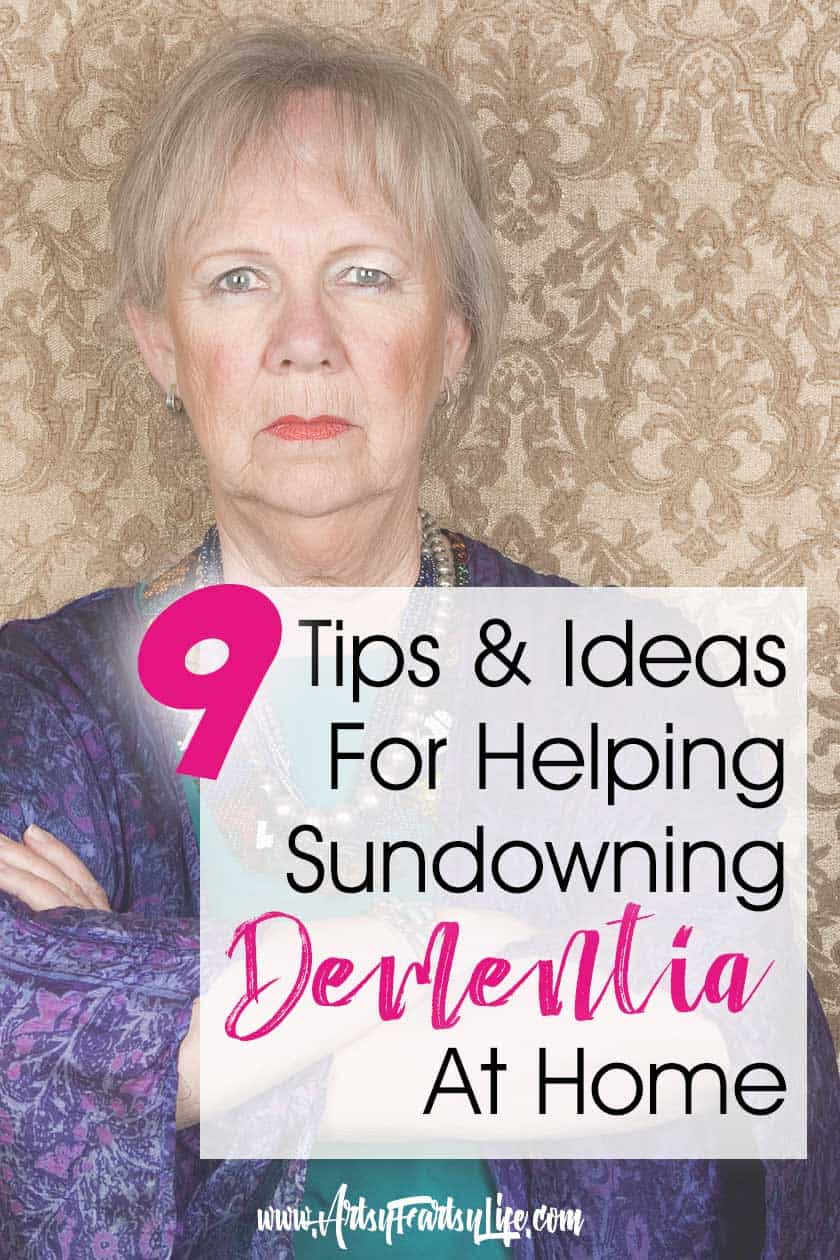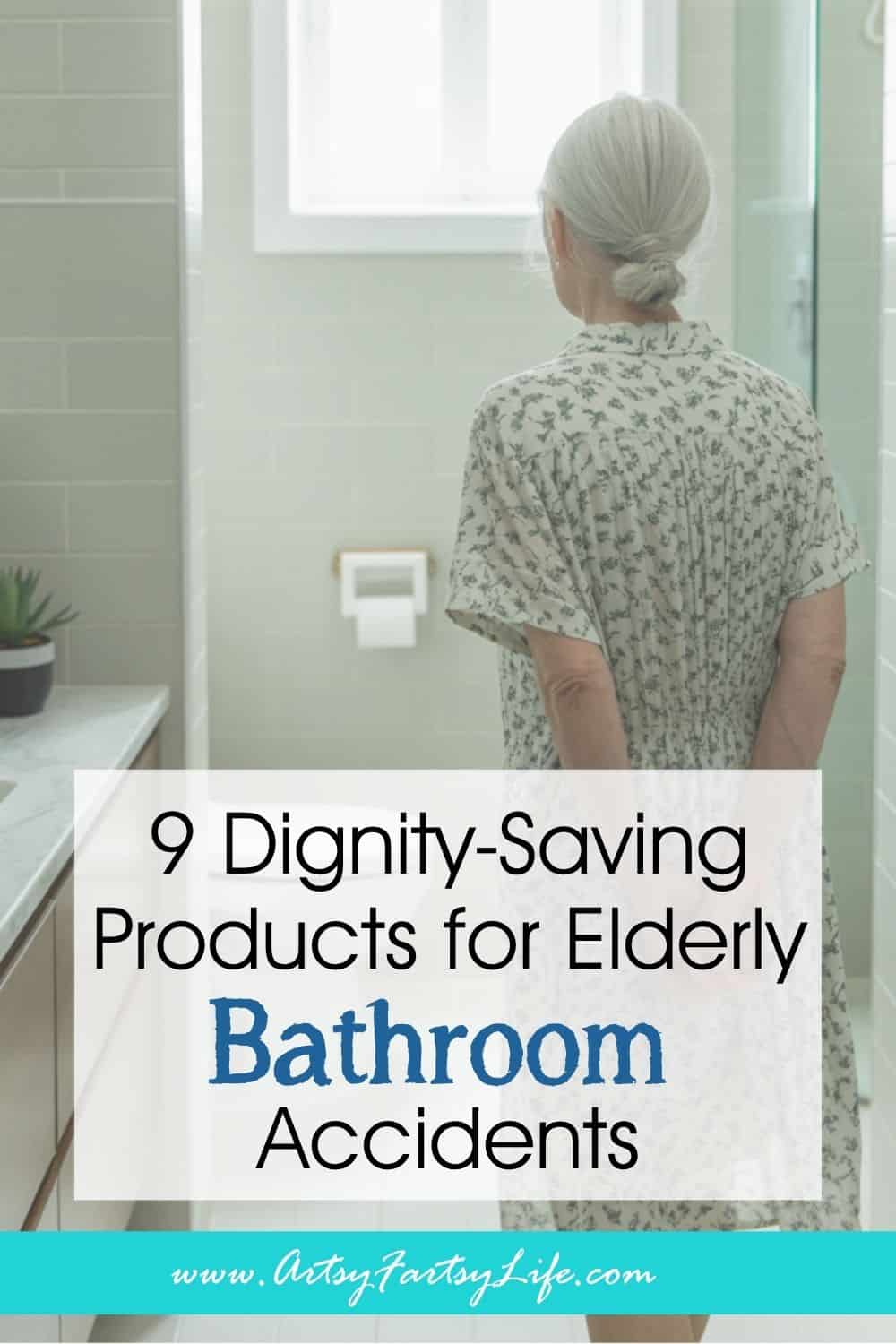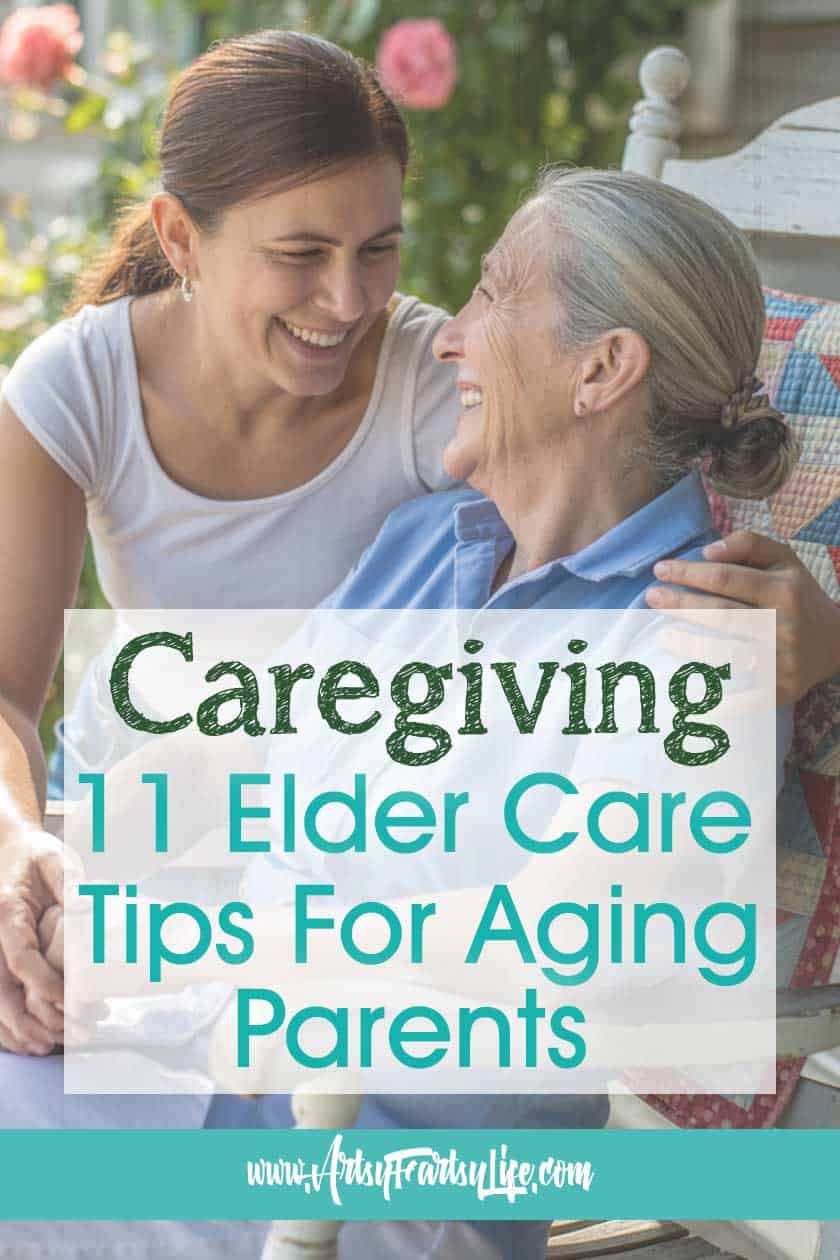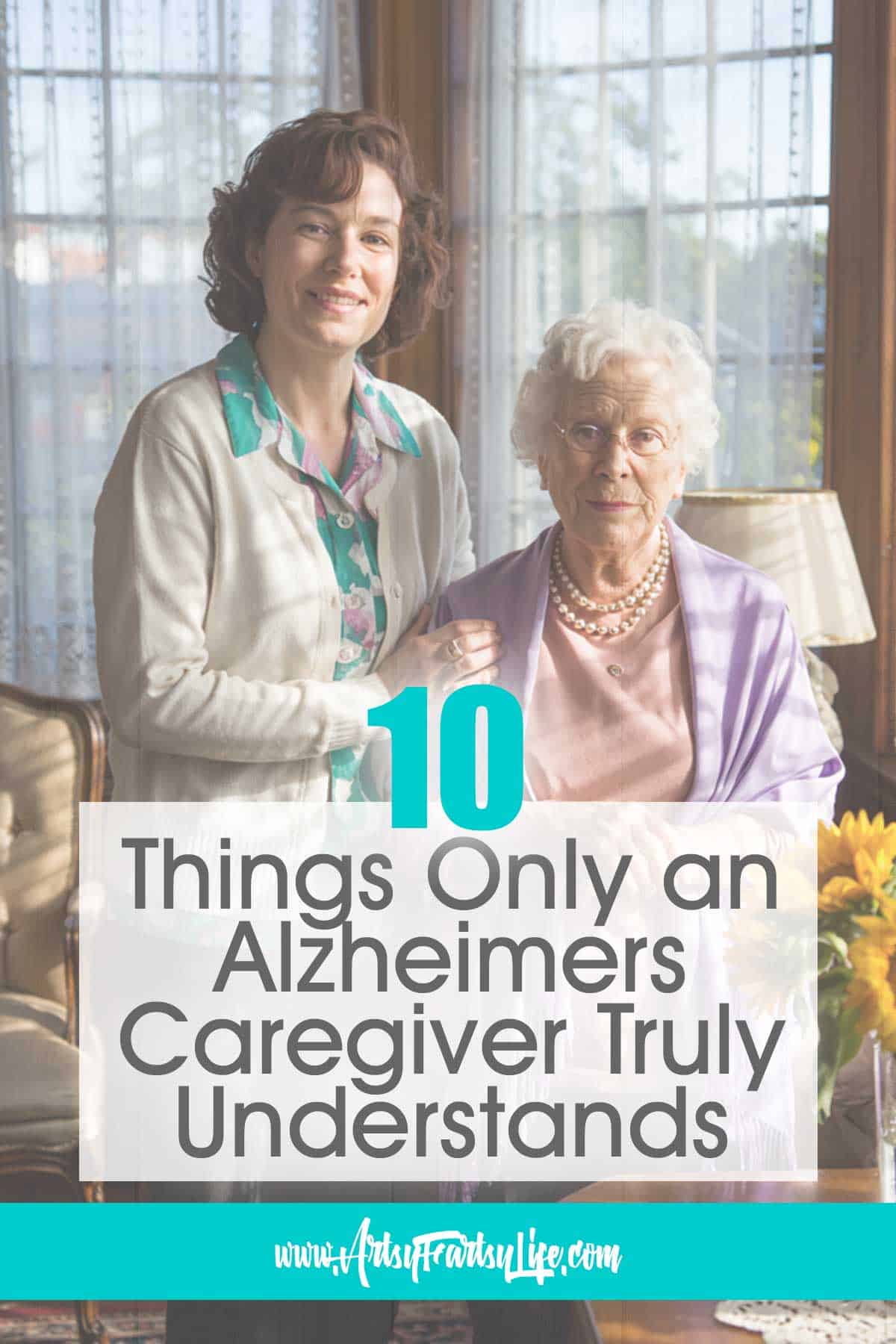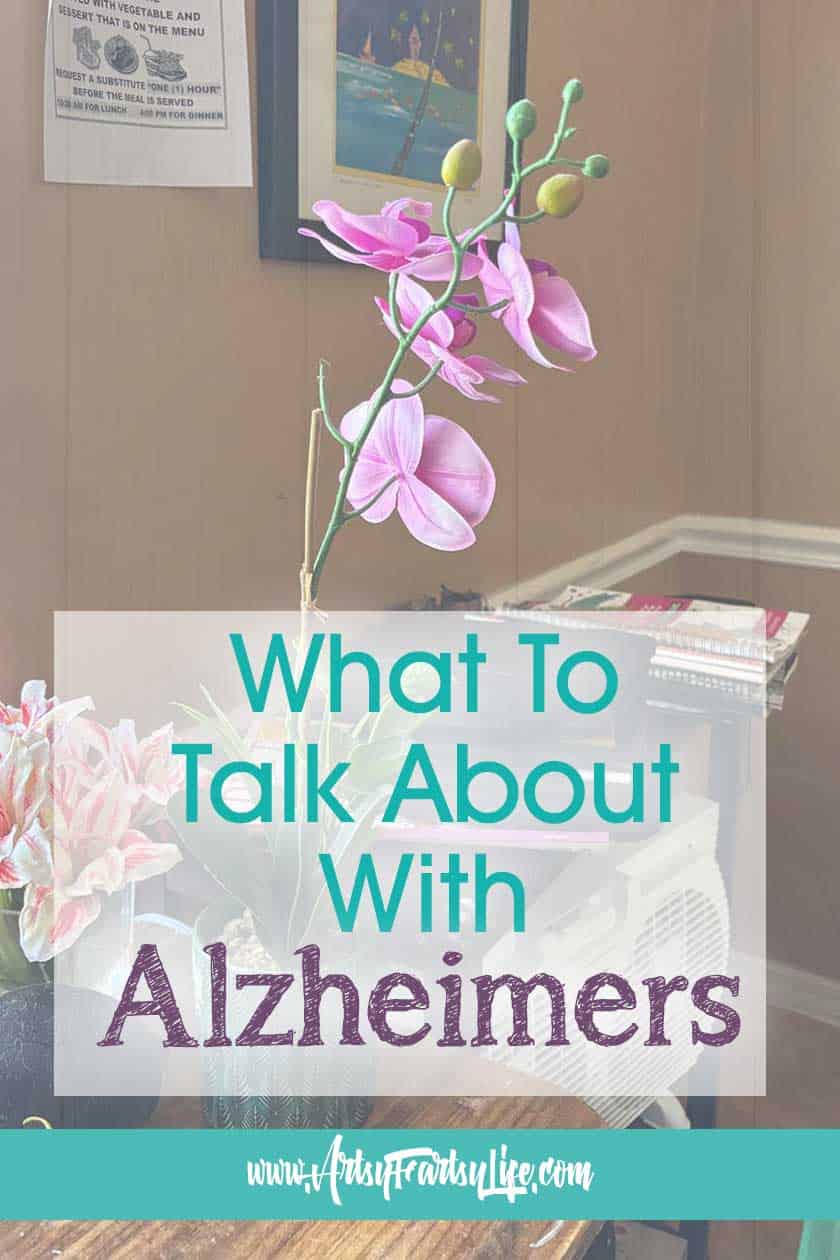Some dementia and Alzheimers patients experience "sundowning" in the evening. Here are 9 natural tips and ideas to help caregivers deal with your loved one's sundowners syndrome when they live in your home.
While it is never fun to see your loved one confused and scared, there are some concrete things we can do to help!
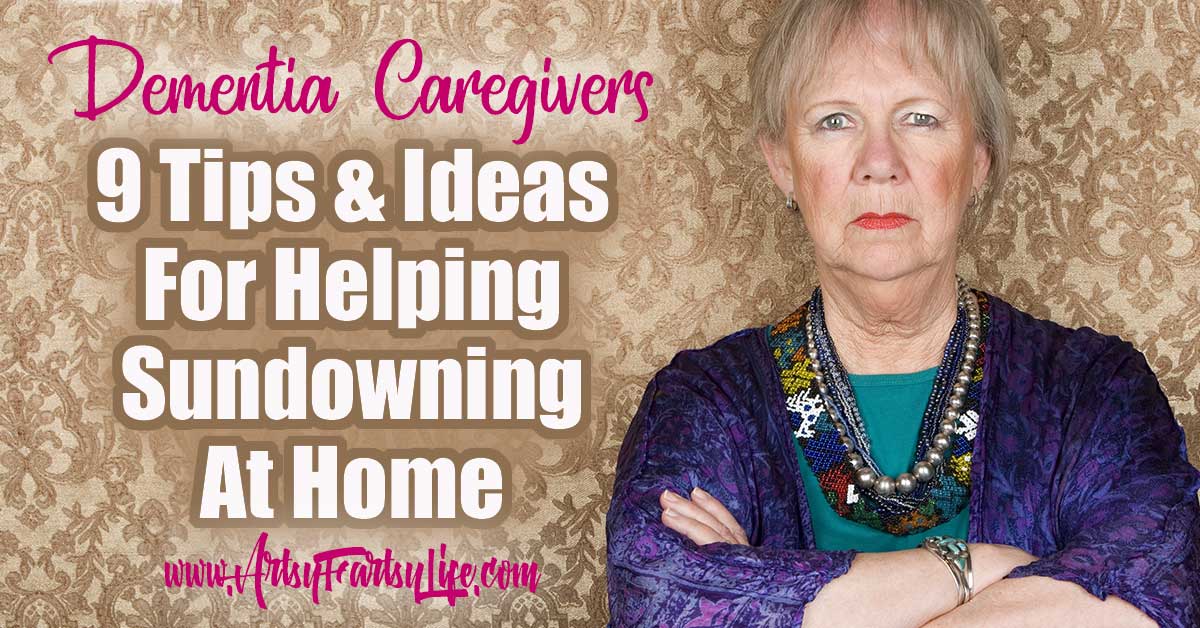
A couple of disclaimers... I am not a medical doctor, this is just info I have collected and observed while taking care of my mother in law who has dementia and lives with us. I often recommend resources, some I receive an affiliate commission for at no additional cost to you, these all help to keep this site free for you!
What Is Sundowning?
It seems that there is not an actual medical diagnosis for Sundowning. According to the National Institue on Aging, it is "restlessness, agitation, irritability, or confusion that can begin or worsen as daylight begins to fade."
Some signs of Sundowing include:
- Worry
- Wandering
- Pacing
- Arguing
- Crying
- Irrational Behavior
- Combative Behavior
- Emotional Outbursts
- Anger
- Hallucinations
- Confusion
- Hostility
- Swearing
- Paranoia
As a caregiver, you should be on the lookout for these sorts of behaviors occurring later in the day when your loved one's energy and brain power are wearing down.
What Does Sundowning Look Like?
Sundowning tends to creep up on our Mom. She definitely doesn't have it every night so I sometimes don't notice right away that something is more wrong than normal. But it was with us last night for sure!
First off, she was mad at my husband (her son) for taking her credit cards with him on his trip out of town (she has a shopping/hoarding problem). Fair enough, I can understand being grumpy about that.
Couple of minutes later she came out to show me the microwave cooker that you can use to make pot roast (in her bedroom). Hmmm I tried to be nice, should have just let that one go because she was almost in tears trying to convince me it was a good idea to have raw meat in her bedroom or bathroom, rather than using our kitchen that is 20 feet away.
Lastly was anger that I was cleaning up a mess that her cat had made ("I can do that myself, I don't want you in here messing with my stuff" even though it had been there the better part of a week) and tears about everything.
Sigh.
Yep, it crept up on me again.
What Are Natural Sundowning Tips?
While I know that there are drugs, sleep aids, CBD oil and other more medical ways to address sundowning symptoms, I leave those to her doctor to prescribe.
2021 Update! We have moved on to considering CBD for Sundowning for Mom... sigh... things always get worse! Check out this post to learn more... CBD For Sundowning Dementia or Alzheimers (A Caregivers Perspective)
To me natural Sundowning tips are things that I can do that will possibly help her to feel a little better or maybe even keep it from happening in the first place.
9 Tips and Ideas For Dealing With Sundowners Syndrome?
I am going to go from easiest, most gentle to more complex things to try...
1. Keep A Routine
I have a pretty good idea that yesterday happened because my husband is out of town and we didn't sit down at the table to eat like normal. The kids and I played hookey and had junk food nachos on the couch and Mom sat in the recliner.
We are generally SUPER routine oriented, having "the dinner" every night around 5:30 unless the kids have sports or some other event. Check out my morning caregiver routine!
So tip #1 is to keep things the same as much as possible and look for signs early if things are not "normal".
2. Keep A Notebook
Most people don't have a blog like this to walk back the traumatic events that have occurred (I cope by writing) so having a notebook where you notice what has been going on before the Sundowning can help.
Some things that I have noted on Sundowner days...
- Visit to the doctor
- Kids home for too many days (especially noisy around Christmas)
- Johnny out of town
- Heard me talking to doctors office about upcoming appointment
None of those things seemed to be that big a deal, but to Mom, change or busyness can seem confusing and cause her to have a bad evening.
3. Redirection
When Mom got sad and weepy last night, I stayed in there and talked about things she is interested in (shopping and the flowers outside her window). I was probably in there for about 15 minutes and when I went in I could tell she was just too polite to tell me to leave, but by the end her mood had lifted a little bit.
I am super busy with kids and pets, but that little time focused just on her and listening to her problems really seemed to help her snap out of the bad thoughts. The forgetting thing sucks most times, but sometimes it works in our favor too!
She forgot she was mad at me and her son and the world. She is SO frustrated at being stuck here and not being able to do anything she wants and I kind of get that! She was on a cycle of not having her credit cards, not being able to drive, not getting to cook in her room, just generally grumpy, and who can blame her? Dementia sucks!
4. Keep The Lights On Bright, Close The Curtains
It seems like you can "trick" your loved one's brain about when the sun goes down by avoiding sunset. Later in the afternoon, but before it becomes dusk, pull the curtains and turn all the lights on in the house so it is bright.
Bonus points for switching your bulbs out to "sunshine" lights that mimic daylight (I like these ones that are shaped like actual lightbulbs!) These are normal lights that are generally in use.
There are also fancier lights called "SAD Lights" that are used to combat Seasonal Affective Disorder (source Mayo Clinic). For sure check with your loved one's doctor before getting one of these to help with Sundowners.


5. Afternoon Nap
Okay, in my research for this post ideas for an afternoon nap were all over the place. Some said for sure to "make" them take a nap and some said to avoid a nap at all costs.
So first off, I have never been successful at "making" Mom do anything and mostly suggestions like, "why don't you take a nap" are met with resistance.
What I would say is track this in your notebook and see how your loved one actually reacts. If they take and nap and sundown, then try to keep them entertained in the afternoon to avoid sleepiness. If they don't take a nap then put on some soothing music in the afternoon and keep activity down to a dull roar to try to get them to take one.
6. Physical Activity
Getting up and going is good for anyone, whether they have Sundowners or not! Getting your loved one moving around (take a walk, do physical therapy exercises, etc.) can help alleviate some of the symptoms.
7. Fidget Tools
If your Mom is less active and not willing to exercise, then keeping her mind active is the next best thing! Our Mom will play games on her iPad if we remind her (get the BIG one and crank up the resolution). You could also get your loved one a fidget blanket or a cute baby or stuffed animal to take care of later in the day to take their mind off of their own problems.


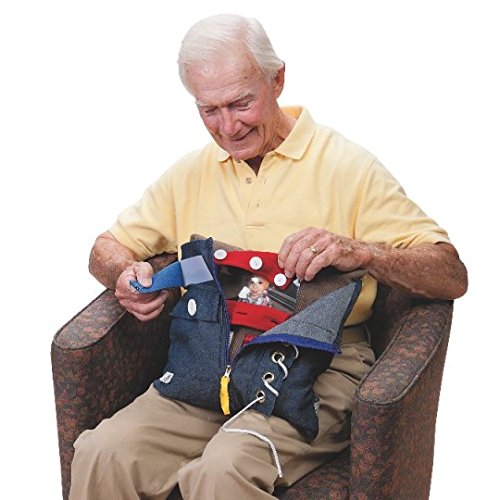
8. Avoid Stimulants
Mom got a coffee maker and is having a cup sometimes in the evening... sigh. It is making it harder for her to sleep and so she is getting up later and Sundowning more. Think I will try taking her some fun drinks in like Sprite or Ginger Ale to see if I can distract her from making coffee (my Mom's is alcohol related dementia so she is already grumpy about not having wine in the evening).
Things to avoid from the afternoon on...
- Booze
- Coffee
- Smoking
- Caffeinated sodas
If your loved one gets aggravated or aggressive, for sure limit the kind of things they have access to starting in the afternoon.
9. Essential Oils
I don't often talk about essential oils and Mom because it can seem kind of "airy fairy". But for sure there are times when using a lavender pillow spray or other oils like Rosemary, Bergamot, Orange, Grapefruit, Patchouli or Frankincense have helped to calm Mom down.
I use little roller bottles with some drops of essential oils and then almond oil so it doesn't irritate her skin. If you don't have cats, you could also use a diffuser or if you have cats, use reeds and a cute bottle.


Additional Sundowning Resources
Doing the research for this post, I found some really great resources that might help you even more!
- Dementia Caregiver Talkshow Podcast # 13: Thirteen Creative Ways to Reduce Sundowning (Video)
- 36 Hour Day (Book)
- Dementia and Sundowning: Tips to help you manage sundowning (Video)
